European Patent Changes
Preparing for the Unified Patent Court and Unitary Patents

Contents
UPC and UP Summary
Decisions
Preparations Needed
– UPC Opt-Out Preparations
– UP Preparations
Costs
Preparing for the Unified Patent Court and Unitary Patents
The introduction of the Unified Patent Court (UPC) and Unitary Patent (UP) will cause a significant shift in decisions that need to be made for pending European patent applications and will force a decision to be made for each granted European patent still in force. This will therefore have repercussions on some or all validations in place for a granted European patent.
The key areas to consider will be around whether to participate in the new UPC and UP systems. The decisions that need to be made, while appearing simple, will often be complex due to a number of factors that need accounting for when considering the needs of one or more cases. This page provides a summary of the relevant parts of the UPC and UP systems, and sets out some of the key decisions to make and provides an outline of where costs can be expected.
If assistance is needed in assessing a portfolio, further information is wanted, or any of the reports mentioned below are wanted, please let us know by emailing us at upc@gje.com or by contacting your usual attorney at GJE.
UPC and UP Summary
The UPC is a centralised European court at which it will be possible to enforce and invalidate all patents granted by the EPO. The intention is that the UPC will, in time, have jurisdiction over all European patents and patent applications in at least 24 of the 27 EU member states. Initially, the geographic jurisdiction will be limited to the EU member states that have completed the ratification of the UPC agreement. During a transition period, initially limited to seven years, it will be possible to opt out granted European patents and patent applications from the jurisdiction of the UPC, which will allow those rights to continue as though the UPC did not exist. This will affect the courts that have jurisdiction over certain validations available at grant of a European patent, and those still in force for European patents that have already been granted.
The UP system provides a UP as a single, unitary, patent right that can be enforced and invalidated, through the UPC only, in any of the countries it covers.
A UP can be created by filing a request for unitary effect with the EPO within one month of grant of a European patent application. The aim of the UP system is to provide a single patent right covering at least 25 of the 27 EU member states. Until those EU member states all ratify the necessary legislation, the geographic scope will only extend to the EU member states where the ratification has been completed. Once a request for unitary effect is accepted, the UP will be in effect and renewal fees will be payable annually to the EPO to keep the UP in force.
Since the UPC and UP systems are yet to be fully operational, it is not currently possible to obtain a UP and it is not currently possible to opt out of the jurisdiction of the UPC. Once the UPC and UP systems are operating, providing the relevant conditions are met (which are set out below), a UP will be available for each newly granted European patent application in parallel to the existing system or validating countries that are member states of the EPO. When a UP is requested, validations will not be available for the countries covered by a UP. These countries will continue to be available as validation countries when a UP is not requested.
There will be a Sunrise period before the UPC and UP systems start full operation. The Sunrise period will only be three to four months long, and is currently anticipated to start in early 2023. It will only become possible to opt out from the UPC jurisdiction from the start of the Sunrise period. There will be a longer wait to be able to obtain a UP, which will only be possible at the end of the Sunrise period when the UPC and UP systems start fully operating. However, the EPO have transitional provisions in place that will allow formal delays during the Sunrise period to allow a UP to be obtained from the end of the Sunrise period.
More details can be found in our UPC and UP FAQs and our introductory pages on the UPC and UP.
Decisions
In order to allow as much time as possible for action to be taken in the Sunrise period before the UPC and UP systems are fully operational, it is time to start considering the various decisions that need to be made in relation to all granted and pending European patents and patent applications. These decisions are:
- whether any granted European patents or pending European patent applications should be opted out from the jurisdiction of the UPC;
- whether to try to delay grant of existing European patent applications in order to allow a UP to be obtained for such cases; and
- whether to request a UP at grant of existing or future European patent applications.
The outcome of these decisions can significantly affect a business, and will often need to be made on a case-by-case basis.
Where a European patent or patent application has been licensed, there is an additional factor to consider when deciding whether or not to participate in the UPC and UP systems. This is what the wishes of the licensee(s) may be. Many licences will not have anticipated the UPC and UP systems entering into force, and regardless of whether they do or not, the entry into force of these systems is a matter on which a licensee is likely to have a view. This may mean it is worthwhile discussing the options for any licensed European patent or patent application with the licensee(s).
Please contact us if you wish to discuss this further or if you would like us to provide a report of the affected cases that we handle for you.
Preparations Needed
Should a decision be made to opt out any cases or to request a UP for a case, several actions will need to be taken to ensure that decision can be put into effect without incident.
UPC Opt-Out Preparations
GJE will be able to handle opt-out requests for you of all relevant European cases held on our records, and any additional European cases you wish us to request are opted out.
To legitimately obtain an opt-out of any granted European patent or pending European patent application, a series of requirements need to be met. As representatives, GJE will be able to handle the opt-out process for you, but there are certain points where we will need input. For each case to be opted out, the points on which we will need input are:
- details, if applicable, of each Supplementary Protection Certificate (SPC) granted based on the case to be opted out, including the number of the SPC;
- for cases already on our records we will need:
- confirmation that the name and address we hold for each registered owner of the case and any SPC based on the case is up to date,
- confirmation that the registered owner is the legal owner of the case, and if not, the full name and address of the legal owner(s), and
- confirmation of the full name and address of each further legal or registered owner of the case and, if applicable, each SPC based on the case;
- for cases not on our records that you would like GJE to opt out for you, we will need the European patent application number for the case along with the full name and address of each legal owner and each registered owner of the case and, if applicable, each SPC based on the case; and
- a declaration and authorisation, of which we can provide a copy for execution, that each legal owner and each registered owner of the case and, if applicable, each SPC based on the case agrees they are the only owner(s), the case is to be opted out and GJE is authorised to request the opt-out.
Additionally, once the UPC is fully operating, we will need confirmation that, to the best of your knowledge, no action before the UPC is pending or concluded on each case to be opted out.
As noted above, to make it easier to compile the above information, we are able to provide a report of your affected cases that we hold on our records. If you would like us to provide such a report, please let us know.
UP Preparations
As with UPC opt-outs, GJE will be able to handle requests for unitary effect to obtain a UP for all European cases held on our records and any additional European cases on which you wish us to request unitary effect.
Since it will not be possible for requests for unitary effect to be accepted until the UPC and UP systems are fully operating, should a UP be wanted on any specific cases that may grant before the second half of 2023, we recommend attempts are made to delay grant. We can advise on how best to achieve this if you wish, including whether informal means of delay are needed or whether the EPO’s UP transitional provisions available during the Sunrise period can be used.
It will be possible to obtain a UP from any European patent application, even if that patent application has been opted out from the UPC. However, this will mean the opt-out is automatically removed once the request for unitary effect is accepted.
In order for a request for unitary effect to be accepted by the EPO to allow a UP to be obtained, the following will be needed:
- the European patent application must still designate all countries that have currently completed their ratification of the UPC agreement;
- the European patent application must have the same claims in each of those countries;
- an individual or general authorisation will be required for GJE to act on your behalf (the EPO is to issue new authorisation forms in due course, that we will be able to provide); and
- a translation of the specification must be filed with the request for unitary effect, translating the specification into a language of any EU country if already in English and into English if the specification is in French or German.
A non-machine translation should be filed to meet the translation requirements. This will mean careful consideration as to what language to translate the specification into if the original specification is in English.
In addition to providing a report for consideration of cases to potentially opt out, we are able to provide a report of pending applications to help you identify which you may wish obtain a UP on. If you would like us to provide such a report, please let us know.
Costs
There has been an acceptance by the UPC authorities that a number of businesses will want to make use of the opt-out facility, so no official fee will be charged on opt-out requests. Additionally, the EPO intend to recoup the costs of processing requests for unitary effect through the renewal fees due on UPs, meaning there will be no official fee for requesting unitary effect.
GJE intend to charge a small, volume based, fee for opting out patents and patent applications, and we will charge a set fee for requesting unitary effect. If you would like details of what our fees will be, please contact us via gje@gje.com or by contacting your usual attorney at GJE. For enquiries regarding fees for opting out patents and patent applications, please provide an indication of the volume of cases you are considering opting out so we can provide you with greater certainty on costs.
We look forward to working with you in relation to the UPC and UP systems, and welcome any questions you may have.
Related resources
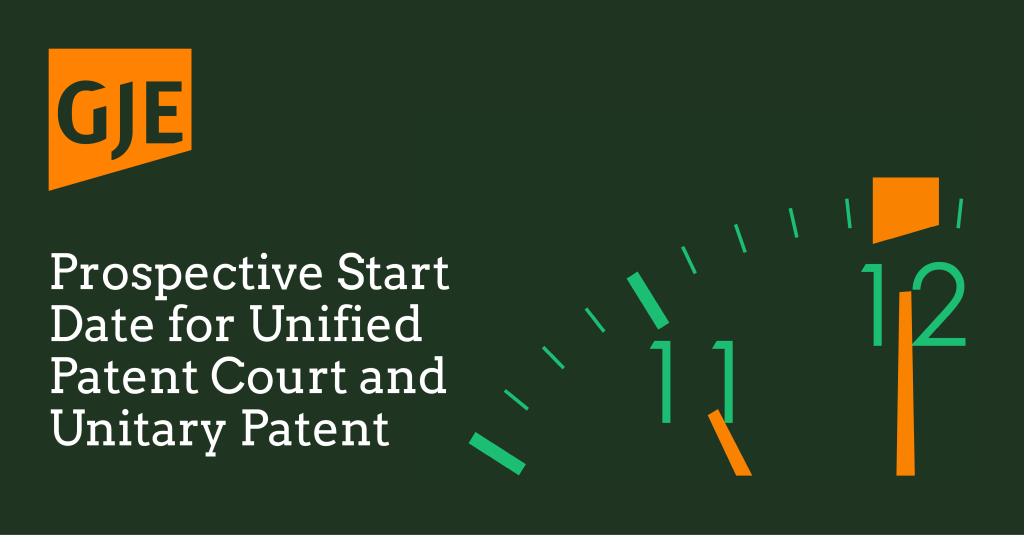
Prospective Start Date for Unified Patent Court and Unitary Patent
During September there were whispers of a possible date on which the Unified Patent Court (UPC) would start...
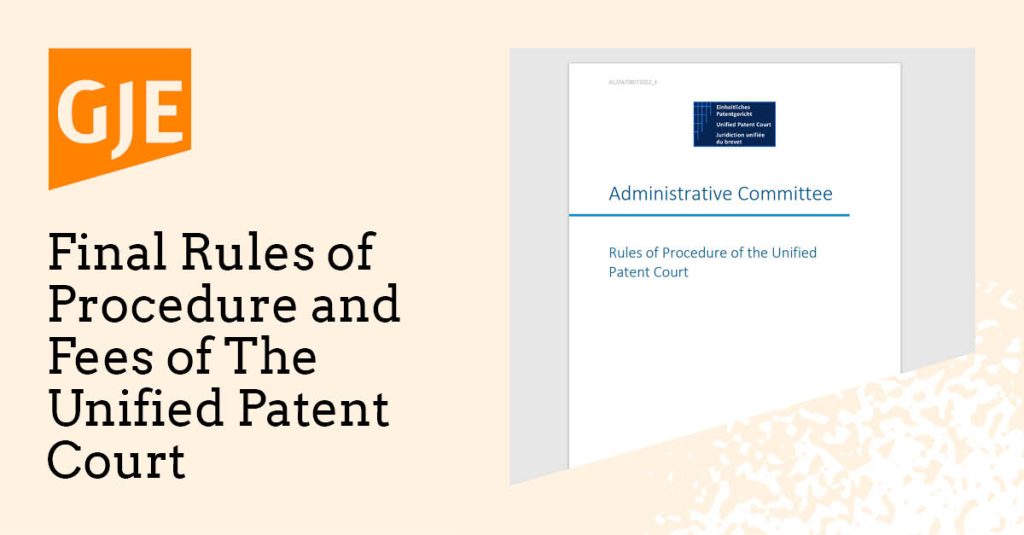
Final Rules of Procedure and Fees of The Unified Patent Court
Europe’s new Unitary Patent (UP) and Unified Patent Court (UPC) are coming. In the majority of EU countries,...
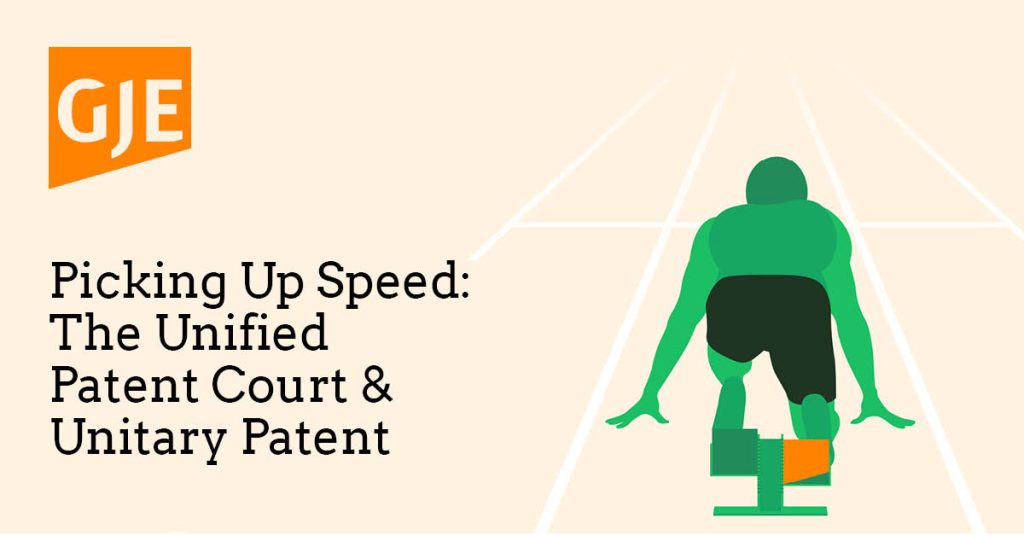
Picking Up Speed: The Unified Patent Court and Unitary Patent
The introduction of the Unified Patent Court (UPC) and the parallel Unitary Patent (UP) will be one of...
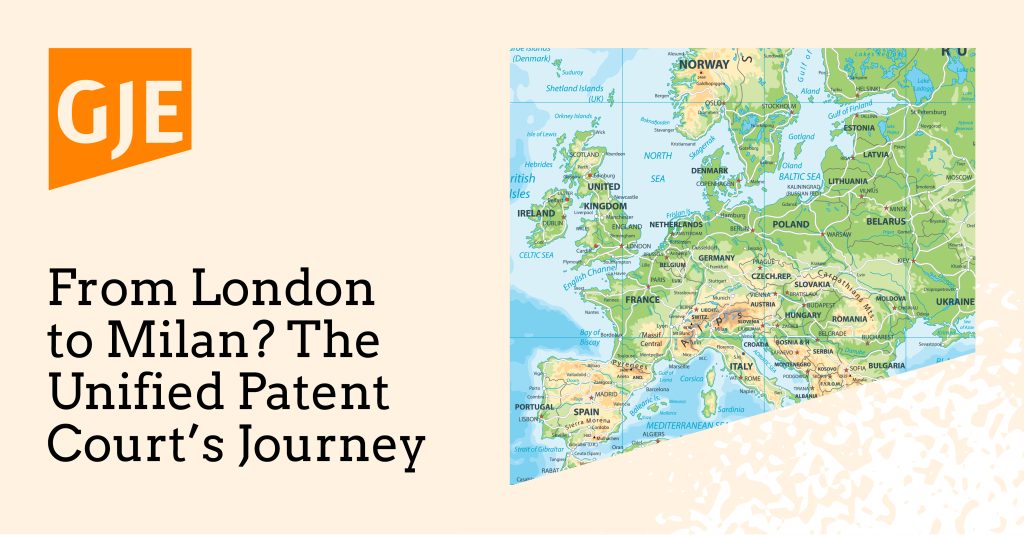
From London to Milan? The Unified Patent Court’s Journey
The introduction of the Unified Patent Court (UPC) will be part of the biggest shake up in European...

Unified Patent Court Brought to Life
The Unified Patent Court (UPC) has started running due to Austria completing the ratifications of the UPC Agreement...
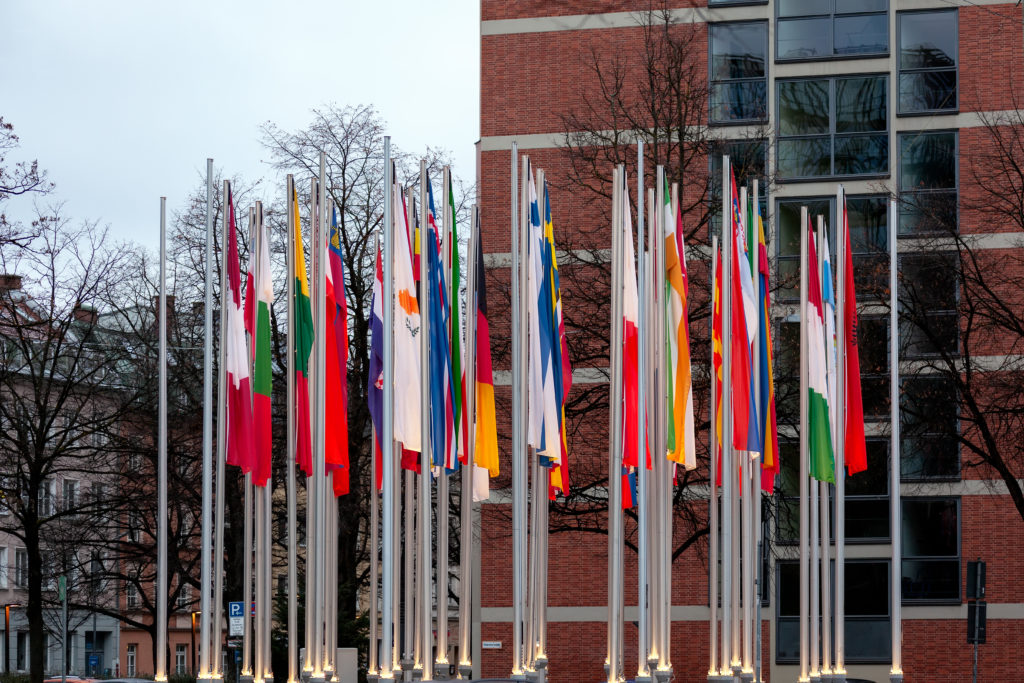
UPC – Block to Progress Lifted
The German Federal Constitutional Court issued a press release on 9 July 2021 regarding the challenge to Germany’s...
